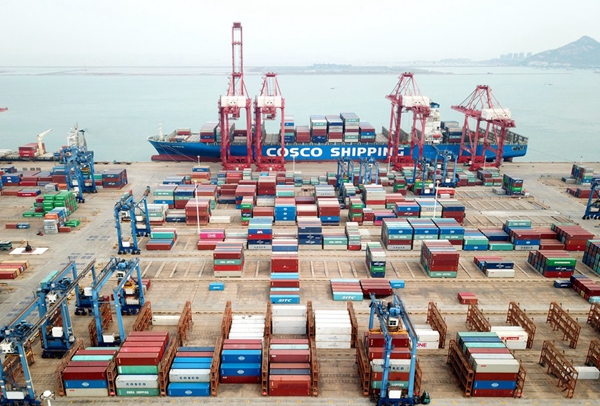America needs to be honest, tariffs aren't beneficial
- By Tom Fowdy
 0 Comment(s)
0 Comment(s) Print
Print E-mail China.org.cn, April 7, 2022
E-mail China.org.cn, April 7, 2022

On March 23, the United States announced that it would be reinstating tariff exemptions on 352 items imported from China, which had previously expired at the end of the Trump administration's tenure. Although fewer than before, the Wall Street Journal reported that the exemptions include: "certain kinds of bicycle parts, electric motors, machinery, chemicals, seafood and duffel bags." They come amid disruptions in U.S.-China ties, but nonetheless add to a growing body of evidence that suggests tariffs imposed on China during the Trump administration have ultimately been detrimental to the United States and not delivered any economic gains.
The U.S. economy is not as great as it looks. Although President Joe Biden and others in his administration have presented the country's recovery from COVID-19 as a great success, pointing toward some of the strongest indicators in decades, this is misleading. The first few months of this year have been a reality check on numerous fronts. First of all, America's annual inflation rate from February stands at an eyewatering 7.5%, a level which has been triggered by an overwhelming supply of money through excessive stimulus, constraints on supply chains, rising commodity costs and of course that which no U.S. politician wishes to publicly admit: the impact of Trump-era tariffs on China.
Trump's legacy has been to cement protectionism as a new political orthodoxy in the U.S., irrespective of economic realities. That is, to demand American jobs are put first, and to effectively scapegoat China for the decline of U.S. industries, which in reality is a construct of the American neoliberal system itself, wherein companies seek the largest profit margins in a globalized economy and voluntarily choose to offshore in the process. This blame game against China has naturally led to unrealistic policy goals and outcomes, including the debunked promise that tariffs can "return jobs" to the United States, or at least as the administration once stated, to "third-shore" them to other countries.
Biden has very much embraced this "America first" approach to economic governance, which also as a whole opposes the premise of free trade. This means that unilaterally rolling back tariffs against China on a large scale is rendered tantamount to political suicide in the U.S. without first receiving enormous concessions from Beijing, who they continue to accuse of "unfair economic practices." U.S. trade with China is no longer presented as mutually beneficial, but a zero-sum game with an obsessive focus on "who wins" and "who loses." This means that even when economic dialogue with China is considered, it is pursued with a one-sided approach of what China can give to the U.S., as opposed to the other way around.
However, the sudden announcement of new tariff exemptions shows that cracks are starting to appear in this approach. If the tariffs were aimed at reducing or diversifying American trade away from China or bringing jobs back home, they have ultimately been ineffective. In 2021, bilateral trade between the two countries reached $755.6 billion, an increase of 28.7% year on year. The increase in trade has been fortified by the reality that in terms of manufacturing capacity, logistics and lower prices through large scale supply and demand margins, China has remained the only country in the world capable of facilitating a supply chain large and effective enough for America's consumer needs, which were comparatively very large given the scale of the government's stimulus measures and the shift away from COVID-19 restrictions.
This means that the tariffs, imposed all the way back in 2018-2019, were not a game changer at all. Instead, as U.S.-China trade has grown, they have contributed to a surge in inflation, passing down costs to U.S. consumers and quickly pushing price rises into a vicious cycle. Companies were unable to find alternative supply chains as it was neither affordable or feasible in the short term, and instead had to raise their prices. This has begun to put pressure on the U.S. economy, with the Federal Reserve having misleadingly for a year tried to dismiss the inflation as "transitory" and has since been forced into interest rate hikes. New developments have also added new uncertainties, including the Ukraine crisis which has led to surging commodity and energy costs, further increasing prices across the board.
As a result, the Biden administration has decided to introduce tariff reprieves on a select number of products. This will be good for both the U.S. and China, yet it fails to directly confront the problem that Trump's trade war tariffs against China are a self-defeating move which only exist to affirm negative and reactionary protectionist sentiment, rather than truly supporting the national interests of the United States. The exemptions are perceived by businesses and some in congressional committees as insufficient for resolving the situation. In the end, however, the United States will ultimately benefit more from open trade relations with China, than pursuing the unattainable fantasy of protectionism.
Tom Fowdy is a British political and international relations analyst and a graduate of Durham and Oxford universities. For more information please visit:
http://m.formacion-profesional-a-distancia.com/opinion/TomFowdy.htm
Opinion articles reflect the views of their authors, not necessarily those of China.org.cn.
If you would like to contribute, please contact us at opinion@china.org.cn.





